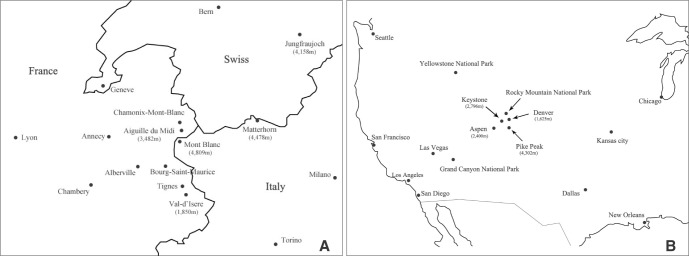Neurointervention.
2016 Sep;11(2):73-77. 10.5469/neuroint.2016.11.2.73.
Altitude Stress During Participation of Medical Congress
- Affiliations
-
- 1Division of Nephrology, Department of Internal Medicine, University of Ulsan, Asan Medical Center, Seoul, Korea.
- 2Department of Neurology, University of Ulsan, Asan Medical Center, Seoul, Korea.
- 3Department of Radiology, College of Medicine, University of Ulsan, Asan Medical Center, Seoul, Korea. dcsuh@amc.seoul.kr
- KMID: 2350683
- DOI: http://doi.org/10.5469/neuroint.2016.11.2.73
Abstract
- Medical congresses often held in highlands. We reviewed several medical issues associated with altitude stress especially while physicians have participated medical congress held in high altitude. Altitude stress, also known as an acute mountain sickness (AMS), is caused by acute exposure to low oxygen level at high altitude which is defined as elevations at or above 1,200 m and AMS commonly occurs above 2,500 m. Altitude stress with various symptoms including insomnia can also be experienced in airplane. AMS and drunken state share many common features in symptoms, neurologic manifestations and even show multiple microbleeds in corpus callosum and white matter on MRI. Children are more susceptible to altitude stress than adults. Gradual ascent is the best method for the prevention of altitude stress. Adequate nutrition (mainly carbohydrates) and hydration are recommended. Consumption of alcohol can exacerbate the altitude-induced impairments in judgment and the visual senses and promote psychomotor dysfunction. For prevention or treatment of altitude stress, acetazolamide, phosphodiesterase inhibitors, dexamethasone and erythropoietin are helpful. Altitude stress can be experienced relatively often during participation of medical congress. It is necessary to remind the harmful effect of AMS because it can cause serious permanent organ damage even though the symptoms are negligible in most cases.
MeSH Terms
-
Acetazolamide
Adult
Aircraft
Altitude Sickness
Altitude*
Child
Corpus Callosum
Dexamethasone
Erythropoietin
Humans
Judgment
Magnetic Resonance Imaging
Methods
Neurologic Manifestations
Oxygen
Phosphodiesterase Inhibitors
Sleep Initiation and Maintenance Disorders
White Matter
Acetazolamide
Dexamethasone
Erythropoietin
Oxygen
Phosphodiesterase Inhibitors
Figure
Reference
-
1. Basnyat B, Murdoch DR. High-altitude illness. Lancet. 2003; 361:1967–1974. PMID: 12801752.2. Park D, Kim M, Lee GY, Yang KH, Park HS, Suh DC. Medical Problems during Participation of Medical Congress - A Long Trip to Val D’Isere from Korea. Neurointervention. 2016; 11:1–4. PMID: 26958405.
Article3. U.S. Army Research Institute of Environmental Medicine. Altitude accli-matization and illness management: Technical Bulletin Medical 505. 1st ed. Washington DC: U.S. Department of the Army;2010. p. 1–119.4. Roach RC. B Bearch institute of environmental meake louise consensus committee. The lake louise acute mountain sickness scoring system. In : Sutton JR, houston CS, coates G, editors. Hypoxia and molecular medicine. Burlington: Queen city printers;1993. p. 272–274.5. Moraga FA, Osorio JD, Vargas ME. Acute mountain sickness in tourists with children at Lake Chungara (4400 m) in northern Chile. Wilderness Environ Med. 2002; 13:31–35. PMID: 11929059.6. Cottrell JJ, Lebovitz BL, Fennell RG, Kohn GM. Inflight arterial saturation: continuous monitoring by pulse oximetry. Aviat Space Environ Med. 1995; 66:126–130. PMID: 7726775.7. Lee AP, Yamamoto LG, Relles NL. Commercial airline travel decreases oxygen saturation in children. Pediatr Emerg Care. 2002; 18:78–80. PMID: 11973496.
Article8. Hackett PH, Roach RC. High-altitude illness. N Engl J Med. 2001; 345:107–114. PMID: 11450659.
Article9. Basnyat B, Tabin G. Altitude illness. In : Kasper DL, Fauci AS, Hauser SL, Longo DL, Jameson JL, Loscalzo J, editors. Harrison's Principles of Internal Medicine. 19th ed. New York: McGraw-Hill;2015. p. 476e-1–476e-6. .10. Girasek DC, Olsen CH. Airline passengers' alcohol use and its safety implications. J Travel Med. 2009; 16:311–316. PMID: 19796100.
Article11. Bookstein FL, Connor PD, Huggins JE, Barr HM, Pimentel KD, Streissguth AP. Many infants prenatally exposed to high levels of alcohol show one particular anomaly of the corpus callosum. Alcohol Clin Exp Res. 2007; 31:868–879. PMID: 17386071.
Article12. Kapogiannis D, Kisser J, Davatzikos C, Ferrucci L, Metter J, Resnick SM. Alcohol consumption and premotor corpus callosum in older adults. Eur Neuropsychopharmacol. 2012; 22:704–710. PMID: 22401959.
Article13. Luks AM, McIntosh SE, Grissom CK, Auerbach PS, Rodway GW, Schoene RB, et al. Wilderness Medical Society consensus guidelines for the prevention and treatment of acute altitude illness. Wilderness Environ Med. 2010; 21:146–155. PMID: 20591379.
Article14. Heo K, Kang JK, Choi CM, Lee MS, Noh KW, Kim SB. Prophylactic effect of erythropoietin injection to prevent acute mountain sickness: an open-label randomized controlled trial. J Korean Med Sci. 2014; 29:416–422. PMID: 24616593.
Article15. Coleman T, Brines M. Science review: recombinant human erythropoietin in critical illness: a role beyond anemia? Crit Care. 2004; 8:337–341. PMID: 15469595.16. Miskowiak K, Inkster B, O'Sullivan U, Selvaraj S, Goodwin GM, Harmer CJ. Differential effects of erythropoietin on neural and cognitive measures of executive function 3 and 7 days post-administration. Exp Brain Res. 2008; 184:313–321. PMID: 17828390.
- Full Text Links
- Actions
-
Cited
- CITED
-
- Close
- Share
- Similar articles
-
- Treatment and Prevention of High Altitude Illness and Mountain Sickness
- Altitude, Immigration and Suicide Rates: A Study from Turkey
- Report on participation to the 3rd Asia Pacific Congress on Diseases of the Chest
- High Altitude Remains Associated with Elevated Suicide Rates after Adjusting for Socioeconomic Status: A Study from South Korea
- Down Syndrome in Moderate Altitude Residents: Are There Unique Features?



